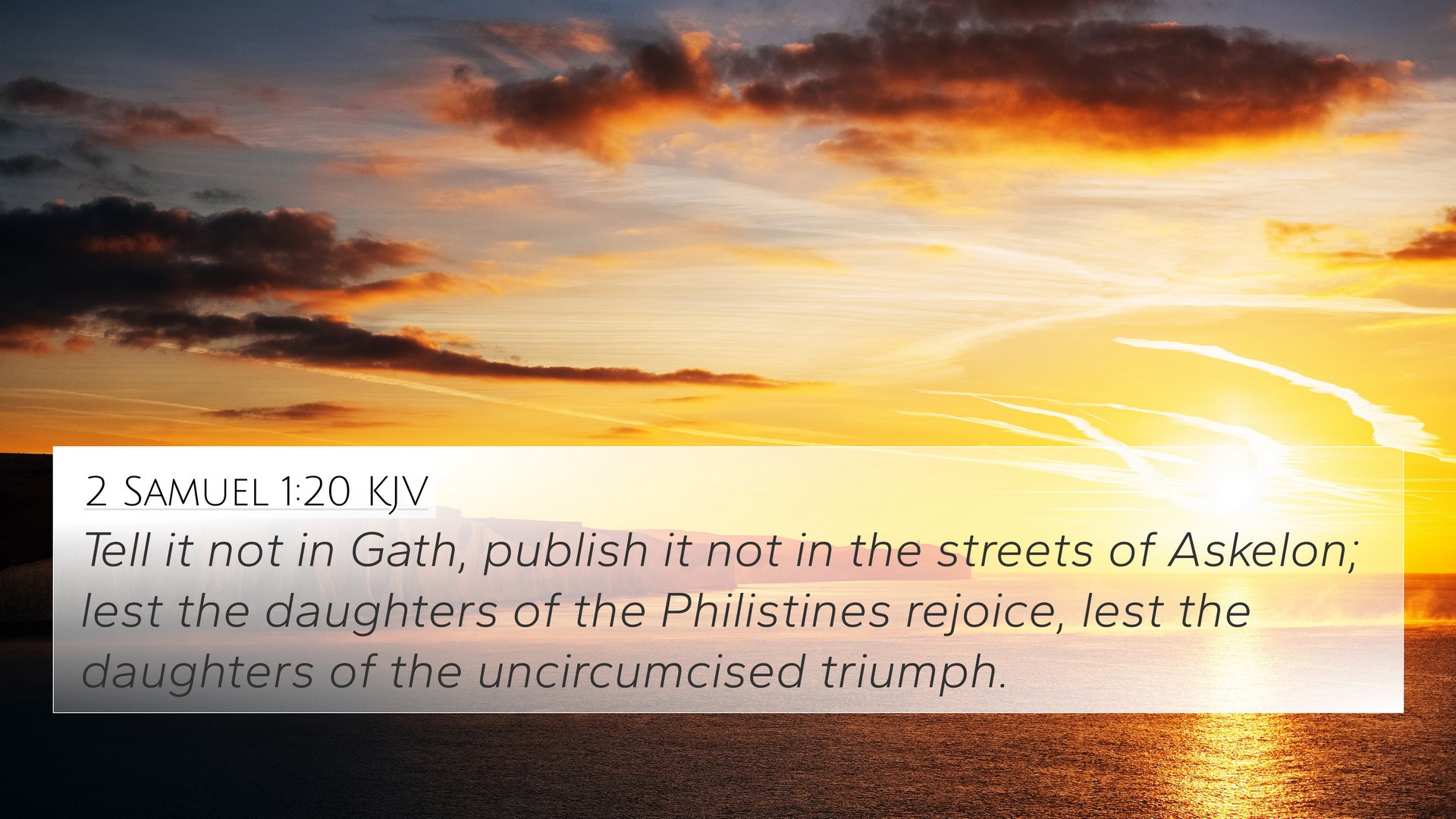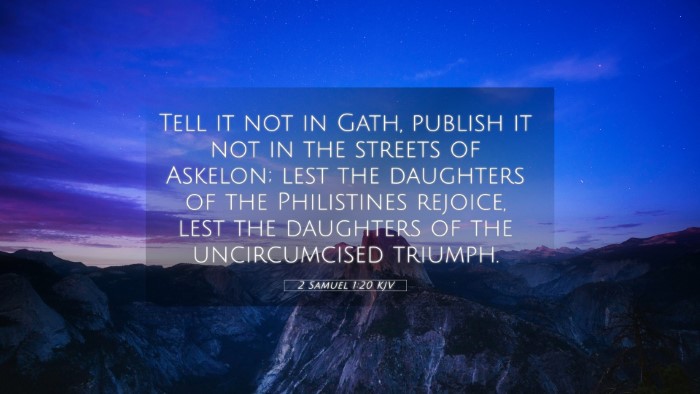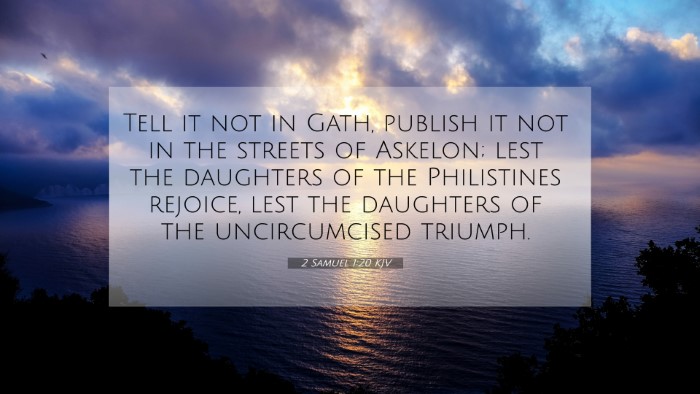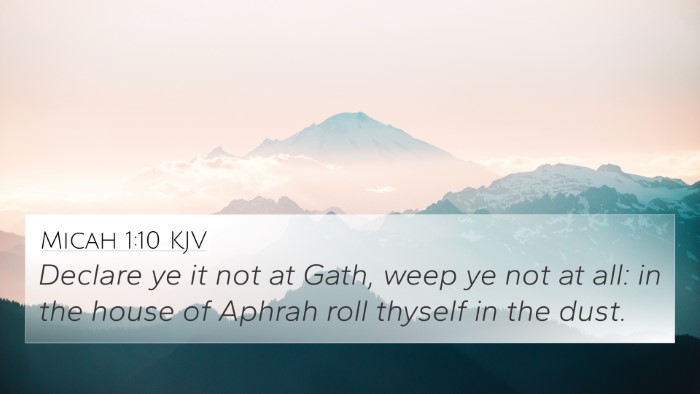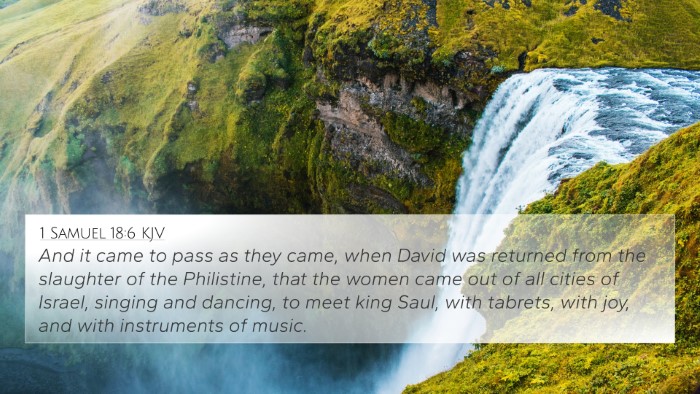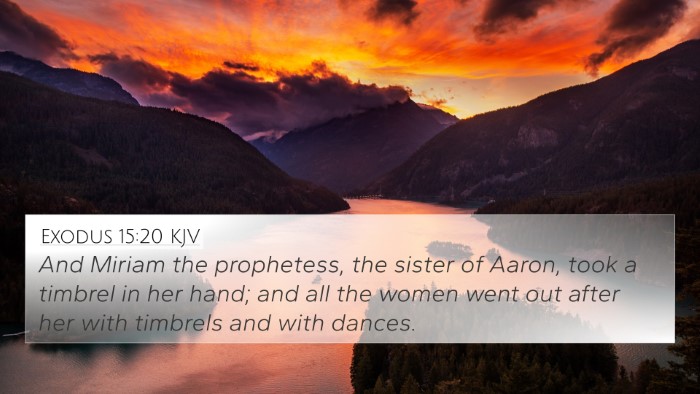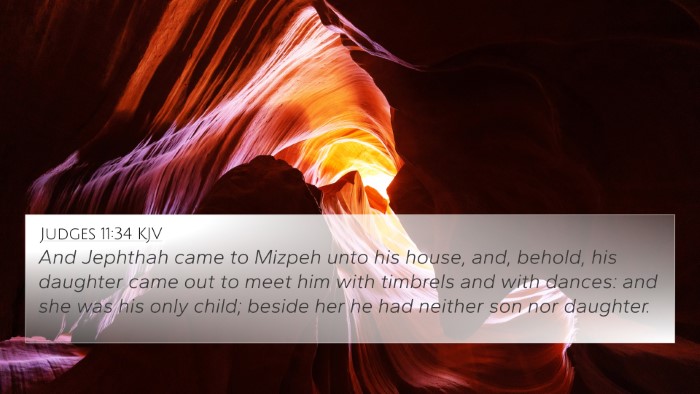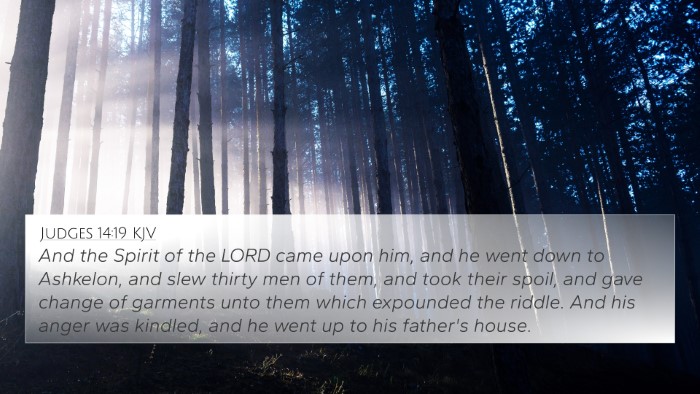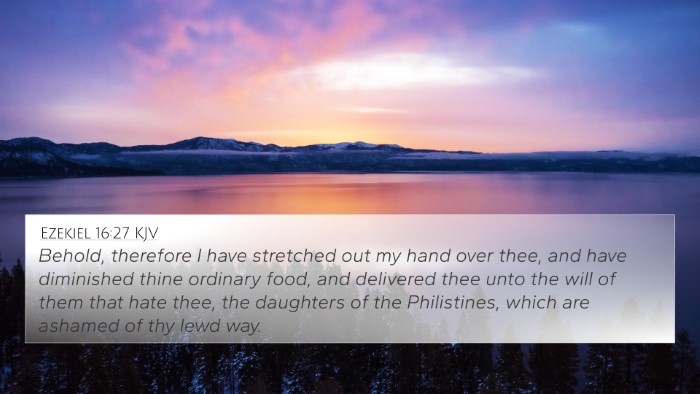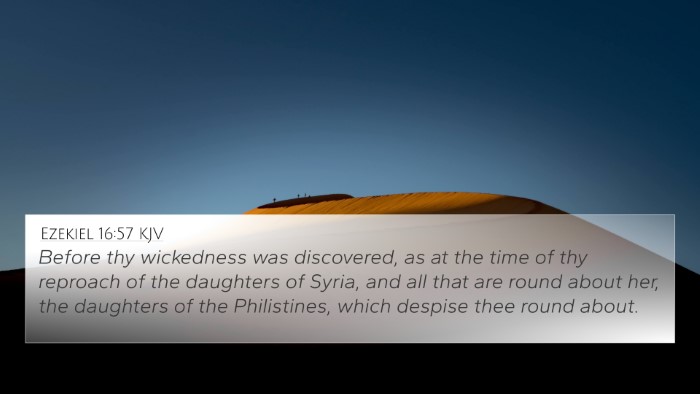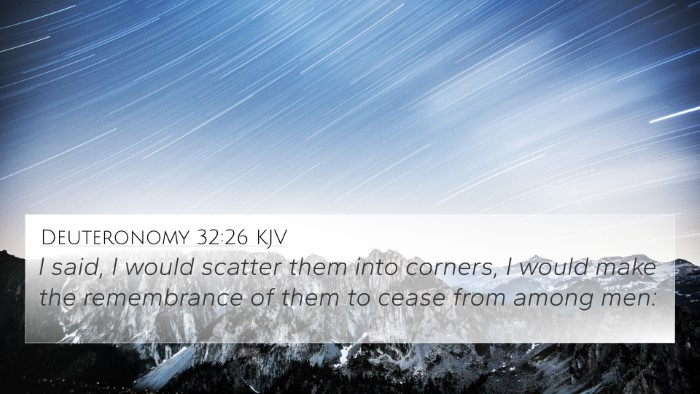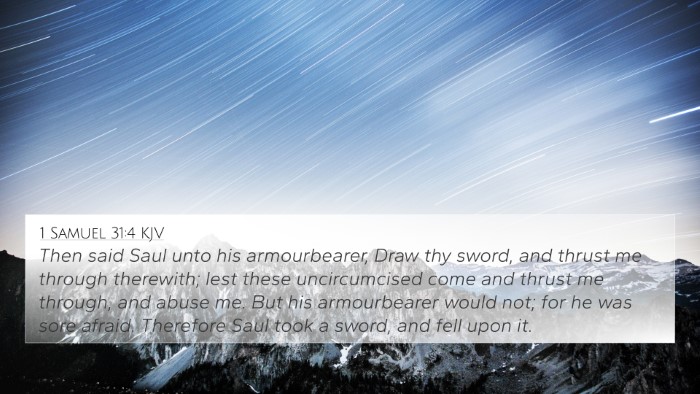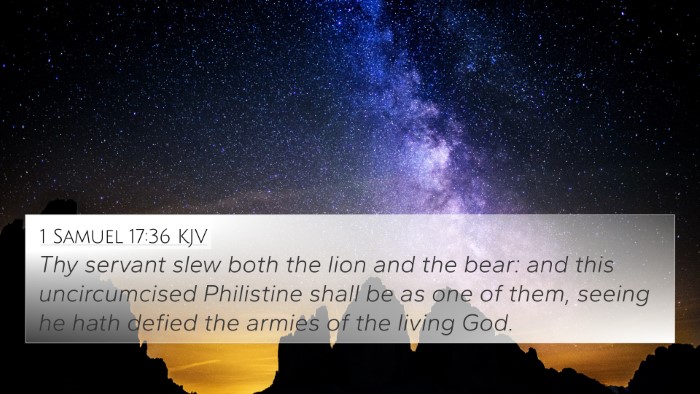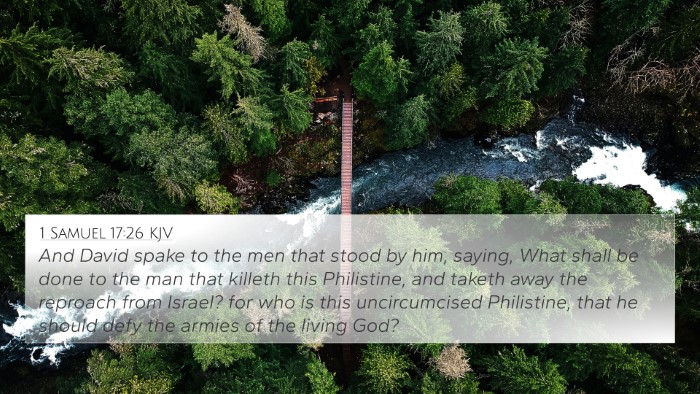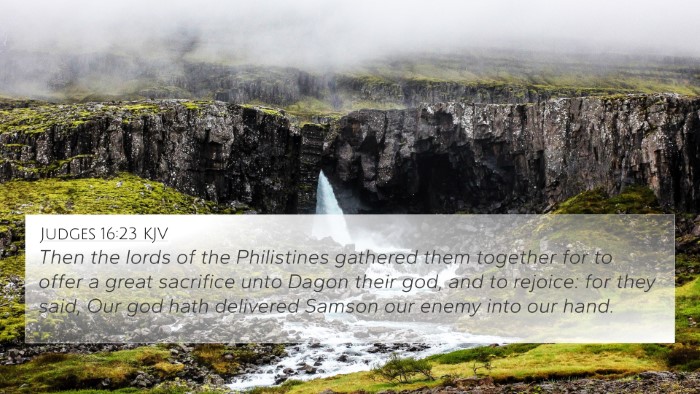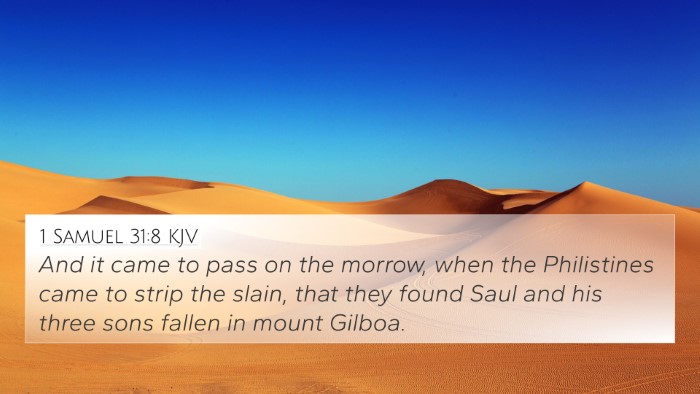Understanding 2 Samuel 1:20
Verse: "Tell it not in Gath, publish it not in the streets of Ashkelon; lest the daughters of the Philistines rejoice, lest the daughters of the uncircumcised triumph." (2 Samuel 1:20)
Summary of Meaning
The verse 2 Samuel 1:20 captures a poignant moment in the narrative of King David's lament upon learning of Saul and Jonathan's deaths. David, in his grief, urges that the news should not be broadcast in the neighboring Philistine cities of Gath and Ashkelon. This expresses both his sorrow and a desire to protect the honor of the fallen and the nation of Israel from the ridicule of their enemies.
Commentary Insights
Matthew Henry's Commentary
Matthew Henry notes that David's instruction “Tell it not in Gath” reflects a deep sensitivity to the feelings and attitudes of his own countrymen as well as those of his enemies. He understands that the Philistines would take joy in Israel's grief, using the opportunity to mock and rejoice over the fall of a once mighty king and his son. David's lament is a heartfelt appeal to honor the memory of Saul, despite their tumultuous relationship. Henry emphasizes that David sought to preserve the dignity of Israel amidst their loss.
Albert Barnes' Commentary
Albert Barnes elaborates on the implications of David’s command to conceal news of Saul's death. He perceives it as an act of sensitivity showcasing David’s respect for Saul’s position as king. Furthermore, by asking silence regarding the deaths, David showcases a meritocracy of honor over enmity, establishing that their deaths deserved mourning rather than celebration. This expressed a political and emotional astuteness on David’s part, recognizing that the day of mourning should not be tainted by the resentment held by their enemies.
Adam Clarke's Commentary
Adam Clarke discusses the cultural significances of lamentation during the biblical times and how David’s plea reflects not only his personal grief but a broader national sentiment. Clarke indicates that the call to silence is also a delineation of respect towards the fallen, emphasizing that harsh voiced jubilation from the Philistines would rob such tragedy of its gravity. This was less about fearing Philistine retaliation and more about maintaining a sense of honor and piety among the Israelites. Clarke also touches on the technical view of how this lament reflects David's status as an emerging king sympathetic toward both the fallen and his nation's integrity.
Applications of 2 Samuel 1:20
- Honor and Grief: This verse reflects the importance of honoring those who have passed, even those with whom we have had conflicts.
- Sensitivity to Enemies: Understanding how our losses can be perceived by others teaches us to approach grief with a level of awareness.
- Public Image: The verse serves as a reminder of the collective identity shared by a people and how external opinions can influence public sentiment.
- Unity in Mourning: David’s call reflects the unity that mourning can bring to a nation, binding them together against external mockery.
Cross-References
This scripture relates to various others within the Bible, showcasing inter-Biblical dialogue concerning grief, honor, and the relationship between enemies and allies. Here are some relevant cross-references:
- 1 Samuel 31:8-10: This passage describes the death of Saul and the way his body was treated by the Philistines.
- 2 Samuel 3:33-34: David expresses sorrow over the death of Abner, reflecting David's values regarding respect for the dead.
- 1 Samuel 18:1-4: Offers insight into David’s close relationship with Jonathan, making the lament more personal.
- Psalms 37:1: Provides context on the emotions surrounding the enemies of the Lord.
- Jeremiah 48:10: Discusses the consequences of lacking diligence and honor in dealings with others.
- Micah 1:10: Similar call for silence amidst the celebration of adversity faced by enemies.
- Ecclesiastes 3:4: Acknowledges the place for mourning in life’s cycles.
- Psalms 3:1-2: David’s own reflections on adversaries would resonate with the Philistine reaction.
- Psalms 79:1-4: This connects Israel's national grief with the mocking nature of their enemies.
- Isaiah 14:9-11: Discusses the triumph of the enemy in the wake of grief.
Conclusion
2 Samuel 1:20 serves as a profound reminder of the way we handle grief, loss, and public perception in times of tragedy. David's powerful instruction to keep the news of Saul's death from enemies encapsulates a longing for respect and dignity in mourning. The interconnectedness of scripture through cross-references enriches our understanding of this verse’s implications, providing multiple layers of meaning and reflection.
Further Study Suggestions
If you are interested in exploring deeper connections and reflections related to this verse, consider utilizing a Bible concordance or engaging in cross-reference Bible study. Tools for Bible cross-referencing can guide you in exploring broader themes and particular narratives that resonate with 2 Samuel 1:20. Understanding these connections provides a more comprehensive view of biblical teachings on honor, grief, and the relationships between adversaries.
